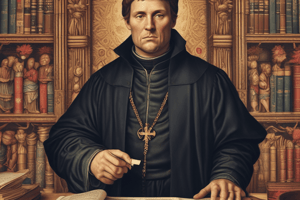Podcast
Questions and Answers
Explain one reason why Henry VIII of England wanted to break free from the pope and the RCC.
Explain one reason why Henry VIII of England wanted to break free from the pope and the RCC.
He wanted to pursue his political ambitions.
What was a significant consequence of the Reformation related to the sale of indulgences?
What was a significant consequence of the Reformation related to the sale of indulgences?
The end of the sale of indulgences.
Name one language into which the Bible was translated as a result of the Reformation.
Name one language into which the Bible was translated as a result of the Reformation.
German, French, or English.
What was the purpose of the Counter-Reformation within the RCC?
What was the purpose of the Counter-Reformation within the RCC?
Describe one impact of the Peace of Augsburg (1555) on German territories.
Describe one impact of the Peace of Augsburg (1555) on German territories.
What major conflict arose as a result of the Reformation's religious divisions?
What major conflict arose as a result of the Reformation's religious divisions?
Wa a di main cause a concern fi nuff a di pipple during di Protestant Reformation?
Wa a di main cause a concern fi nuff a di pipple during di Protestant Reformation?
Ow did di invention a di mechanized printing press help di spread a di Protestant Reformation?
Ow did di invention a di mechanized printing press help di spread a di Protestant Reformation?
Weh did nuff pipple waan do wid di Bible during di Protestant Reformation?
Weh did nuff pipple waan do wid di Bible during di Protestant Reformation?
Weh did many pipple waan rely pon fi dem religious guidance during di Protestant Reformation?
Weh did many pipple waan rely pon fi dem religious guidance during di Protestant Reformation?
A weh some pipple did believe seh forgiveness come from during di Protestant Reformation?
A weh some pipple did believe seh forgiveness come from during di Protestant Reformation?
Weh di Protestant Reformation seek fi do wid di Roman Catholic Church?
Weh di Protestant Reformation seek fi do wid di Roman Catholic Church?
Flashcards are hidden until you start studying
Study Notes
The Protestant Reformation
Background
The Protestant Reformation marked the end of the Middle Ages and began in earnest in the 16th century. It was a major cultural, political, and religious movement throughout Europe that aimed to reform the Roman Catholic Church (RCC) through the development of the study of the Bible, the institution of the printing press, and a renewed focus on individual religious experience.
Key Factors
-
Money-generating practices: The sale of indulgences, a practice in the RCC where individuals could buy forgiveness for sins, was a primary cause of concern for many during the Reformation. This practice was seen as corrupt and contrary to the teachings of Christ.
-
Reform calls: Scholars like Martin Luther, John Calvin, Huldrych Zwingli, and others demanded reform of the RCC.
-
Printing press: The invention of the mechanized printing press allowed religious ideas and Bible translations to circulate widely, facilitating the spread of the Reformation.
-
Biblical language: The desire to read the Bible in the language spoken at home rather than in Latin was a key factor in the Reformation's success.
-
Reliance on Bible: Many people wanted to rely only on the Bible for religious guidance rather than on tradition or current teachings.
-
Forgiveness: A belief that forgiveness comes only from God and not from a combination of faith and good deeds was also a significant factor.
-
Political ambitions: Henry VIII of England aimed to break free from the pope and the RCC, which contributed to the spread of the Reformation in England.
Consequences
-
Emergence of Protestantism: Protestantism became one of the three major branches of Christianity alongside Roman Catholicism and the Eastern Orthodox Church.
-
Sale of indulgences: The end of the sale of indulgences was a significant outcome of the Reformation.
-
Translation of the Bible: The Bible was translated into German, French, English, and many other languages.
-
Counter-Reformation: A movement within the RCC to reform and revive itself was a response to the Protestant Reformation.
-
Improved training: The training and education for some RCC priests improved.
-
Political realignments: The Peace of Augsburg (1555) allowed German princes to decide whether their territories would be Catholic or Lutheran, leading to political realignments.
-
Thirty Years' War: The Thirty Years' War (1618-1648) was a conflict primarily between Roman Catholics, Calvinists, and Lutherans, causing widespread devastation and loss of life.
Lasting Impact
The Protestant Reformation significantly affected political, social, and religious structures in Europe and beyond. Its impact includes:
-
Freedom of religion: Encouraging an emphasis on personal interpretation of religious texts and fostering religious tolerance.
-
Political democracy: Promoting the concept of individual rights and responsibilities, which contributed to the growth of democratic ideologies.
-
"Dignity of the individual": Instilling a heightened awareness of individual worth and autonomy, which has persisted in Western culture.
-
Secularism: The separation of religion from politics and other aspects of life has been attributed to the Reformation, leading to a distinctively modern understanding of religion.
Studying That Suits You
Use AI to generate personalized quizzes and flashcards to suit your learning preferences.



